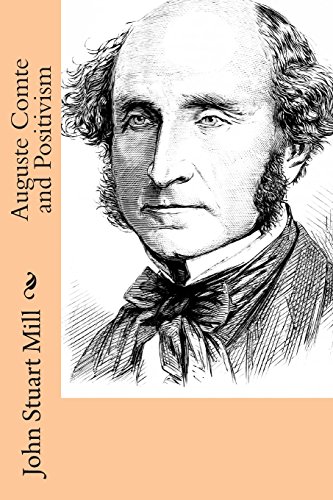Artículos relacionados a Auguste Comte and Positivism

Reseña del editor:
Auguste Comte and Positivism is a classic philosophy essay by John Stuart Mill. For some time much has been said, in England and on the Continent, concerning "Positivism" and "the Positive Philosophy." Those phrases, which during the life of the eminent thinker who introduced them had made their way into no writings or discussions but those of his very few direct disciples, have emerged from the depths and manifested themselves on the surface of the philosophy of the age. It is not very widely known what they represent, but it is understood that they represent something.John Stuart Mill (20 May 1806 – 8 May 1873), usually cited as J. S. Mill, was a British philosopher, political economist, and civil servant. One of the most influential thinkers in the history of classical liberalism, he contributed widely to social theory, political theory, and political economy. Dubbed "the most influential English-speaking philosopher of the nineteenth century",[8] Mill's conception of liberty justified the freedom of the individual in opposition to unlimited state and social control.[9]Mill was a proponent of utilitarianism, an ethical theory developed by his predecessor Jeremy Bentham. He contributed to the investigation of scientific methodology, though his knowledge of the topic was based on the writings of others, notably William Whewell, John Herschel, and Auguste Comte, and research carried out for Mill by Alexander Bain. Mill engaged in written debate with Whewell.[10]A member of the Liberal Party, he was also the second Member of Parliament to call for women's suffrage after Henry Hunt in 1832John Stuart Mill was born at 13 Rodney Street in Pentonville, Middlesex, the eldest son of the Scottish philosopher, historian and economist James Mill, and Harriet Barrow. John Stuart was educated by his father, with the advice and assistance of Jeremy Benthamand Francis Place. He was given an extremely rigorous upbringing, and was deliberately shielded from association with children his own age other than his siblings. His father, a follower of Bentham and an adherent of associationism, had as his explicit aim to create a genius intellect that would carry on the cause of utilitarianism and its implementation after he and Bentham had died.[13]Mill was a notably precocious child. He describes his education in his autobiography. At the age of three he was taught Greek.[14] By the age of eight, he had read Aesop's Fables, Xenophon's Anabasis,[14] and the whole of Herodotus,[14] and was acquainted with Lucian, Diogenes Laërtius, Isocrates and six dialogues of Plato.[14] He had also read a great deal of history in English and had been taught arithmetic, physics and astronomy.At the age of eight, Mill began studying Latin, the works of Euclid, and algebra, and was appointed schoolmaster to the younger children of the family. His main reading was still history, but he went through all the commonly taught Latin and Greek authors and by the age of ten could read Plato and Demosthenes with ease. His father also thought that it was important for Mill to study and compose poetry. One of Mill's earliest poetic compositions was a continuation of the Iliad. In his spare time he also enjoyed reading about natural sciences and popular novels, such as Don Quixote and Robinson Crusoe.His father's work, The History of British India was published in 1818; immediately thereafter, at about the age of twelve, Mill began a thorough study of the scholastic logic, at the same time reading Aristotle's logical treatises in the original language. In the following year he was introduced to political economy and studied Adam Smith and David Ricardo with his father, ultimately completing their classical economic view of factors of production. Mill's comptes rendus of his daily economy lessons helped his father in writing Elements of Political Economy in 1821.
Reseña del editor:
For some time much has been said, in England and on the Continent, concerning "Positivism" and "the Positive Philosophy." Those phrases, which during the life of the eminent thinker who introduced them had made their way into no writings or discussions but those of his very few direct disciples, have emerged from the depths and manifested themselves on the surface of the philosophy of the age. It is not very widely known what they represent, but it is understood that they represent something.
"Sobre este título" puede pertenecer a otra edición de este libro.
- EditorialCreateSpace Independent Publishing Platform
- Año de publicación2015
- ISBN 10 1512324248
- ISBN 13 9781512324242
- EncuadernaciónTapa blanda
- Número de páginas112
- Valoración
Comprar nuevo
Ver este artículo
EUR 9,28
Gastos de envío:
EUR 11,67
De Reino Unido a Estados Unidos de America
Los mejores resultados en AbeBooks
Auguste Comte and Positivism
Publicado por
Createspace Independent Publishing Platform
(2015)
ISBN 10: 1512324248
ISBN 13: 9781512324242
Nuevo
Paperback
Cantidad disponible: 1
Librería:
Valoración
Descripción Paperback. Condición: Brand New. 112 pages. 9.00x6.00x0.26 inches. In Stock. Nº de ref. del artículo: zk1512324248
Comprar nuevo
EUR 9,28
Convertir moneda
Gastos de envío:
EUR 11,67
De Reino Unido a Estados Unidos de America
Destinos, gastos y plazos de envío

